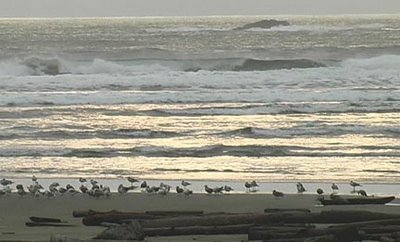
The district's main reservoir on Meares Island has nearly been drained and not enough water is coming across the inlet to Tofino. The town council ordered that all commercial use of water would be banned as of September 1, 2006. Resorts, restaurants, fish plants, and other businesses would have to shut down.
Big bucks from a private company standing to loose a great deal more provided a temporary solution by trucking water in from Ucluelet which bailed out the local businesses for the long week-end. The fact remains that the environment provides a finite amount of drinking water and no amount of financial expansion through development will change that fact.
With a year-round population of 1,500 people the town of Tofino swells to 22,000 during the summer months. Private financial gain is based on an environment that must be respected rather than ignored. The provincial government has been increasingly allowing private commercial corporations to regulate their own development.
Drinking water for Tofino comes from the old growth rainforest on Meares Island which was protected by protesters in 1984 who challenged a logging corporation’s right to log on public crown land. These protests were the first of many that followed in attempts to protect the rainforest of Clayoquot Sound. In 1985, the Nuu-chah-nulth were granted a court injunction to halt logging until their land claim was settled. To date this has not happened and no treaty has been negotiated by the BC government.
Logging continues to increase in Clayoquot Sound from a low of 17,000 cubic meters (1 cubic metre = 1 telephone pole) in 1998 to 145,000 cubic meters (4,400 truck loads) in 2002. This was the latest available statistic due to cut-backs within the BC Ministry of Forests.
This year is worse than most. The typical summer and fall in this area brings drought and water shortages. Numerous golf courses, logging of watersheds, unrestricted housing developments, industrial run-off into ground water, unlimited well drilling, and massive drainage ditching are some of the contributing factors to drought in this area.
I was outside during much of the short rainfall of Tuesday August 29, replacing garbage pails under the downspouts of our eavestroughs. I was able to bucket water onto many of the trees in our orchard, in my attempt to catch every drop and direct it toward wilting vegetation. The sword ferns that flourish in the usually wet area in the backyard have shriveled up and fallen over as they have dried up during the unforgiving drought.
Our well provides drinking water year-round but there is never enough water for the garden because the natural cycle for this area is that we have an annual drought between June and October every year. The climate is described as ‘Mediterranean’ and we have to live with both the good and the bad of that distinction. The water resources in this region are finite. Water runs out and always has, despite what developers try to spin. This area is such a prime destination because at least four months of the year are dry and seldom bring any rainfall, even though we are know as the raincoast of Canada.
In BC any privately owned land, despite a lack of resolution regarding claims by first nations, is off limits to government officials. The Ministry of Forest is very clear that its employees are not allowed to walk on private land because they have no authority of private logging practices. On private land there are no limits or regulations for logging, mining, road building, or other forms of environmental destruction. Ownership allows destruction with no consequence even if these actions are effecting society as a whole. Both the Ministry of Environment and Transportation have little to no authority over private land owners.
A prime example of how this lack of regulation can effect residents, and the flow of water, occurred in the Alberni Valley earlier this year. Timberwest logged the steep slopes above the small rural community of Cherry Creek, just outside of Port Alberni. As a result, residents suffered three ‘boil water’ advisories over a few months. Today logging activities continue on these slopes despite landslides and drinking water problems. The watersheds of Englishman River, Little Qualicum River, and French Creek continue to be logged despite the fact that they provide drinking water to the majority of residents in Oceanside.